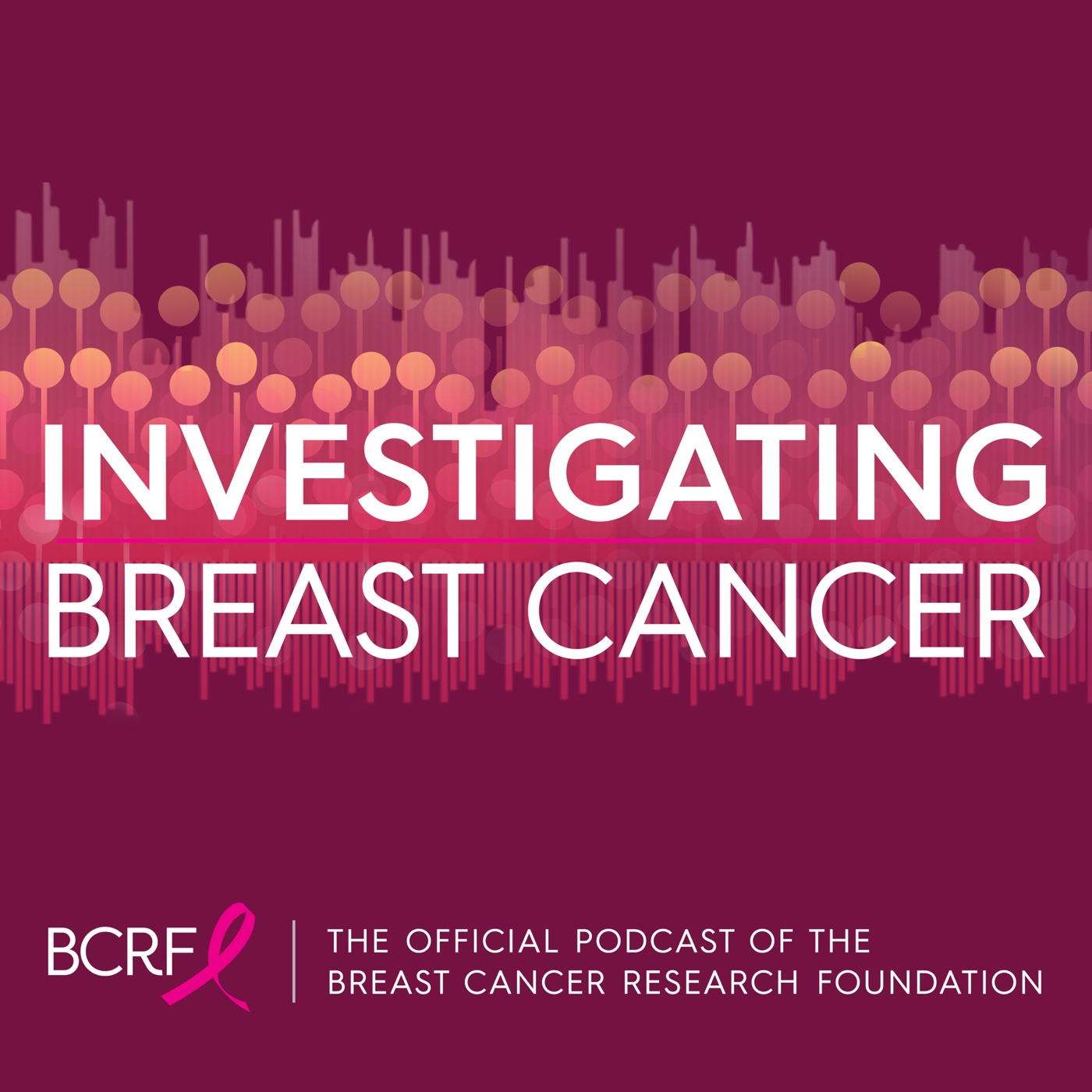Episodes
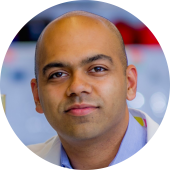
Sunday Oct 01, 2017
The Importance of Patients as Partners, with Dr. Nikhil Wagle
Sunday Oct 01, 2017
Sunday Oct 01, 2017
We begin today with a statistic that is immediately concerning and curious: mortality from breast cancer is higher in black women than in white women. Among the challenges in studying this problem is a lack of data. That's because only a small fraction of the cancer genome atlas, that's the catalog of genetic mutations responsible for cancer, is comprised of African American patients. That's just one of the many obstacles in investing breast cancer that Dr. Nikhil Wagle is trying to solve.
Dr. Wagle is assistant professor of medicine at Harvard Medical School and medical oncologist at the Dana-Farber Cancer Institute, where he also is deputy director of the Center for Cancer Precision Medicine. Another hat that Dr. Wagle wears is leading the Metastatic Breast Cancer Project, a wide ranging effort to gather more breast cancer data, particularly from under-represented populations. I think you'll really enjoy this conversation. Dr. Wagle connects the personal with the science.
As you'll hear, one of his key lessons from years of research, the importance of bringing on patients as partners. You'll also hear something that I found more surprising. In an age of seemingly infinite scientific innovation, one of Dr. Wagle's key tools to building the data base? Social media. You can follow him on Twitter, @NikhilWagle. You also can listen to him here now. ...
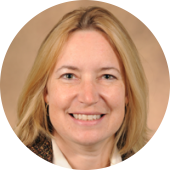
Wednesday Aug 23, 2017
The strength of the immune is about the diversity of a response, with Dr. Karen Anderson
Wednesday Aug 23, 2017
Wednesday Aug 23, 2017
Among the many powerful and intriguing things that Dr. Karen Anderson told me during our terrific conversation: Vaccines have changed the course of human events.
This line – combined with the inspiration Dr. Anderson felt when completing her studies – helped lead her to the important and challenging work she does now: Breast cancer vaccine development, with a long-range goal to deliver vaccines to reduce the risk of breast cancer recurrence after surgery.
Her research focuses on how the immune system can be harnessed to detect and alter cancer development. Dr. Anderson, also, is a current member of the NCI Cancer Biomarker Study section, and has published over 40 peer-reviewed publications. Let's get to the obvious question. What's a translational researcher? That's where our conversation began.
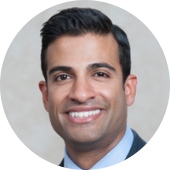
Friday Jun 23, 2017
The role of obesity in breast cancer, with Dr. Neil Iyengar
Friday Jun 23, 2017
Friday Jun 23, 2017
It sounds like a simple question. What is obesity? But like most simple questions, the answer is not as obvious as it may seem. The US Centers for Disease Control and Prevention calls obesity "A national epidemic causing higher medical costs and a lower quality of life." The CDC also notes that obesity is a contributing cause of many other health problems, including heart disease, stroke, diabetes and some types of cancer.
Understanding the relationship between obesity and breast cancer can become located. Not only is there the question of measurement. Is the traditional view of body mass index always accurate or sufficient? But also, important questions around assessing risk. How might the measurement of body composition and blood based factors associated with fat inflammation help develop more precise cancer risk assessments and prognostic strategies? Dr. Neil Iyengar is at the forefront of researching and addressing these questions. He studies obesity, and in particular its relationship to breast cancer. Dr. Iyengar is an assistant member and attending physician in the Breast Medicine Service of the Department of Medicine at the Memorial Sloan-Kettering Cancer Center.
He is also an associate attending physician at the Rockefeller University. In our conversation, Dr. Iyengar noted that he grew up in a family that certainly emphasized science, but where the human component was also central. You'll hear both sides of him in our talk. What is obesity? That's where we started.
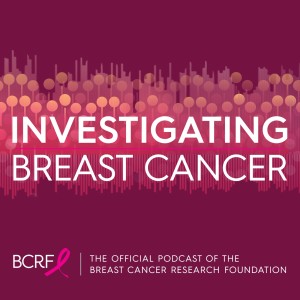
Monday Apr 03, 2017
Monday Apr 03, 2017
Our series is focusing on scientist, thinkers, and leaders who drive the insights and breakthroughs of breast cancer research. Today's conversation proves a simple math problem: two is better than one. Actually today's conversation also tackles some really complicated math and science. Specifically, how applied mathematics and tumor biology are coming together to drive important new research in breast cancer and metastasis.
Doctor Daniele Gilkes is assistant professor of oncology. As well as an assistant professor in chemical and molecular engineering at the Johns Hopkins University School of Medicine. This is her first year as a BCRF grantee. Doctor Paul Macklin is an associate professor of intelligent systems engineering, and a member of the Melvin & Bren Simon Cancer Center at Indiana University. He's a BCRF grantee since 2014.
Together, Gilkes and Macklin are apart of a new partnership between the BCRF and the Jayne Koskinas Ted Giovanis Foundation for Health and Policy that links computational scientists with biologists. This partnership includes three multi-institutional collaborations jointly funded to provide new incites into tumor growth, metastasis, and the mechanics of drug resistance. These ground braking studies will have the potential to substantially advance understanding of cancer biology, and improve clinical outcomes.
You can tell from the conversation, the inner play, between Dr. Gilkes and Macklin this is a true partnership. You can also tell they're doing incredibly important and hard work, and they are having fun. I found myself wondering and I asked both of them, "Whether a cross discipline approach like theirs just might be the future of research?"
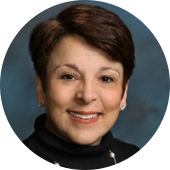
Tuesday Jan 24, 2017
What the beginning of breast cancer looks like, with Dr. Anna Maria Storniolo
Tuesday Jan 24, 2017
Tuesday Jan 24, 2017
What does the beginning of breast cancer look like? What happens – at the very start – that turns normal breast tissue into the first stages of cancer? And by recognizing these early molecular changes and pathway alterations, could we not only improve our understanding of the evolution of breast cancer… but also, one would hope, find a way to stop it before it even begins?
These questions are hardly philosophical. They go to the heart of important research that has been and is being led by Dr. Anna Maria Storniolo.
Dr. Storniolo is a Professor of Clinical Medicine in the Department of Hematology/Oncology at the Indiana University School of Medicine. She is also Director of the Catherine Peachey Breast Cancer Prevention Program, a comprehensive program providing risk assessment and counseling for women who may be at risk for developing breast cancer. She also has been a BCRF Grantee since 2007.
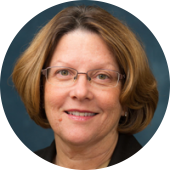
Monday Dec 12, 2016
Getting back to normal, with Dr. Debra Barton
Monday Dec 12, 2016
Monday Dec 12, 2016
The list of symptoms associated with cancers of all kinds is of course extraordinarily long. Particularly, among breast cancer survivors, these can include fatigue, hot flashes, and cognitive changes related to chemotherapy, nausea and vomiting, and sexual health, just to name a few. Of those, while sexual health and functioning have been reported in over 50% of women diagnosed with breast or gynecologic cancer. In most cases, these issues are not a part of standard cancer care which is where the research comes in. How can various physical symptoms, fatigue, body image, and partner issues predict overall sexual health among cancer survivors? What interventions, from clinical, to medications, to behavioral, show the most promise?
Dr. Debra Barton is the Mary Lou Willard French professor of nursing at the University of Michigan School of Nursing. She has spent her career looking at symptom management from multiple perspectives and finding ways to use more than one intervention to reduce symptoms with minimal to no side-effects. She's also been a BCRF grantee since 2008. Doctor Barton, thanks for joining me. This range of symptoms for people undergoing cancer treatments, or even survivors, is so unbelievably long for many folks, both on the science and research side, but also on the patient side and just among folks who are dealing with the disease.

Tuesday Dec 06, 2016
Why research is so important, with Dr. Michael Clarke
Tuesday Dec 06, 2016
Tuesday Dec 06, 2016
Among the many challenges with breast cancer and breast cancer research is metastasis when cancer cells break away from a tumor and travel to distant parts of the body. Within this collection of cells is an important minority group, breast cancer stem cells. These cells are ultimately responsible for cancer related death in women with the disease and understanding how they work is central to much of today's research. At the forefront of that research, Dr. Michael Clarke. Dr. Clarke is a Professor of Medicine at Stanford University and since 2005, a BCRF grantee. He is also the Karel and Avice Beekhuis Professor in Cancer Biology and Associate Director of the Stanford Institute for Stem Cell Biology and Regenerative Medicine.
In 2003, Clarke's lab was the first to identify breast cancer stem cells. Since then, among other findings, Clarke's team has identified two genes critical for stem cell functions including a gene that regulates normal stem cell dormancy which can drive the unpredictable length of time when tumor cells exist quietly without clinical manifestation. It's one of the most pressing problems in breast cancer responsible for late relapses. What's next from Dr. Clarke and his lab? What ideas is he exploring that might help prevent relapse? Dr. Clarke, thanks for joining me. Before we get into the specifics, I'm always curious, why research? What was it about scientific research that once upon a time said to you, "This is where I can make a real difference"?
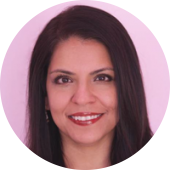
Monday Nov 28, 2016
The intersection of cancer and aging, with Dr. Arti Hurria
Monday Nov 28, 2016
Monday Nov 28, 2016
Among the many important research areas of breast cancer and frankly all cancers is what's called survivorship; quality of life and the ability to live independently. Among older survivors, one area of concern: cognitive decline or memory loss. This is one of the areas that Dr. Arti Hurria studies. Dr. Hurria and her team focus on older, long-term breast cancer survivors looking at memory difference between those who received chemotherapy versus those who did not compared to healthy women of the same age who never had cancer. What might their discoveries offer in terms of predicting potential memory issues among survivors and, importantly, creating interventions to preserve capabilities and the highest possible quality of life?
Dr. Hurria is director of the Cancer and Aging Research Program at City of Hope. She is also co-leader of their Cancer Control and Population Sciences Program. A medical oncologist, Dr. Hurria recently joined the board of directors for the American Society of Clinical Oncology; the worlds leading professional organization of physicians who provide cancer care. She also has been a BCRF grantee since 2012. Dr. Hurria, thanks for joining me.
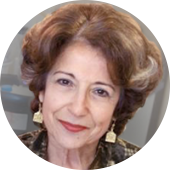
Monday Nov 14, 2016
The outside of a cancer cell matters too, with Dr. Mina Bissell
Monday Nov 14, 2016
Monday Nov 14, 2016
it’s what’s on the inside that matters. It turns out that for cells – including cancer cells – the outside matters a whole lot, too.
Specifically, the interactions between the extracellular matrix and the microenvironment -- the physical context and the connection between the outside of a cell and the inside – is central to how that cell behaves… and, for cancer cells, how they might grow, spread, or most importantly, be stopped.
It’s hard to overstate the magnitude of this breakthrough for biology, cancer research, and importantly, breast cancer research. This singular discovery rewrote decades of scientific understanding, and redirected vast amounts of future research and success. It occurred because of what’s been called the “controversial insistence” of Dr. Mina Bissell.
Dr. Bissell is a Distinguished Scientist at the Lawrence Berkeley National Laboratory at UC Berkeley. She’s also one of the most honored scientists in the world.
Among her many awards, Dr. Bissell received the Ernest Orlando Lawrence Award and medal, the U.S. Department of Energy’s highest scientific honor, the American Cancer Society’s Medal of Honor, There’s even an award named after her – truly, the Bissell Award. She is a member of the American Academy of Arts and Sciences and the Institute of Medicine, earned an honorary degree from the Pierre and Marie Curie University in Paris among other universities, and in 2010 was elected to the National Academy of Sciences. She has published more 300 articles and book chapters.
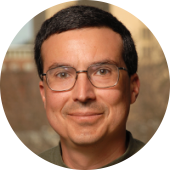
Wednesday Oct 19, 2016
Using modern genetic tools to study breast cancer, with Dr. Charles Perou
Wednesday Oct 19, 2016
Wednesday Oct 19, 2016
Dr. Perou is a member of the Lineberger Comprehensive Cancer Center at the University of North Carolina and the Scientific Director of the UNC Bioinformatics Core.
Perou's reserach has established that breast cancer is not a single disease but instead represents a series of diseases that vary in their prognosis and response to treatment.

